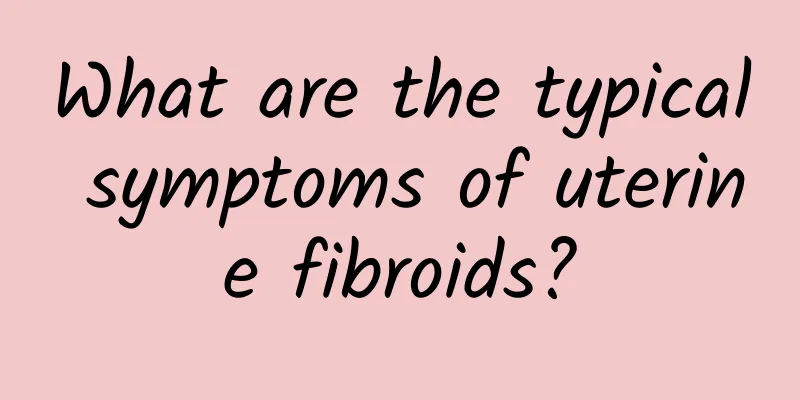What are the causes of irregular menstruation in women? Is it normal for menstruation to last for eight or nine days?

|
Menstrual irregularity is a gynecological disease with a very high incidence rate clinically. According to the latest clinical data statistics, about 30% of the female population in my country suffer from menstrual irregularity. Because many people do not pay attention to menstrual irregularity and do not go to the hospital for treatment in time, the condition worsens. Regarding whether it is normal for the menstrual period to end after 89 days, and the causes of menstrual irregularity in women and other related issues, we specially invited Fu Xiafei, chief physician of Zhujiang Hospital of Southern Medical University, to give us a special interpretation. Is it normal that my period takes eight or nine days to end? It is abnormal for menstruation to end after eight or nine days. Normal menstruation should be 3 to 7 days. If it exceeds 7 days, it is considered to be too long. The causes of too long menstruation are: 1. Organic lesions, such as endometrial polyps and submucous uterine fibroids; 2. Endocrine system disorders. Hormone secretion disorders cause luteal insufficiency and poor luteal function, resulting in too long menstruation; 3. The incision in the uterus of women who have undergone cesarean section does not heal well and is uneven, forming a scar diverticulum, which causes too long menstruation. Can oral contraceptives regulate menstruation? Short-acting oral contraceptives can be used to regulate menstruation. Short-acting oral contraceptives contain relatively low drug doses, so women need to take them for a long time to adjust the menstrual cycle. Commonly used clinical products include Yousiyue. It should be noted that when women experience abnormal uterine bleeding in the early stage of taking the drug, they should seek medical attention in time and adjust the drug and dosage under the guidance of the doctor. What are the causes of irregular menstruation in women? The causes of irregular menstruation include: 1. Internal causes: some existing diseases, such as organic lesions of the uterus, diseases of the gynecological endocrine system, endocrine system diseases, blood system diseases, etc.; 2. External causes: such as female oral contraceptives, use of intrauterine devices; 3. Temporary factors, such as environmental changes, excessive stress, and mental changes; 4. Long-term factors: such as organic lesions. Women's menstrual period usually lasts about a week. If it takes eight or nine days for a long time, it is recommended that the patient go to the hospital for regular examination to determine whether there is any disease in the reproductive system. If the examination confirms that there is a disease in the reproductive system, it needs to be treated in time. There are many reasons for irregular menstruation in women. Pathological factors, physiological factors, environmental factors and drug factors may all lead to irregular menstruation. |
Recommend
What is Trichomonas vaginitis?
What is Trichomonas vaginitis? The bacteria that ...
To control the spread of the disease, you need to understand the precautions of ovarian cysts
Now ovarian cysts have seriously endangered our h...
Getting up early and doing 12 yoga moves can help your metabolism and lose weight quickly
Morning exercise is a habit of many people. The a...
What are the hazards of cervicitis in women? Women must be alert to the five major hazards
Women who suffer from cervicitis may experience s...
Treatment principles for uterine fibroids How to treat uterine fibroids
Uterine fibroids are tumors after all, so they ca...
Three common misunderstandings about the treatment of cervical cancer Six traditional Chinese medicine prescriptions for cervical cancer
In recent years, more and more women have been su...
5 sins of recurrent vaginitis
Vaginitis is prone to recurrence, and 39% of wome...
What is the difference between menopause and amenorrhea? Why do women go through menopause at a certain age?
What is the difference between menopause and amen...
What are the symptoms of cervicitis in women? What are the care methods for women with cervicitis?
Cervicitis is a common gynecological disease for ...
What should women with cervical erosion pay attention to in their diet? 10 kinds of food have a therapeutic effect on cervical erosion
I believe that many women have come into contact ...
How to develop beautiful legs! 3 Yoga Moves to Show Your Absolute Domain
It’s not difficult to have a pair of “pencil” leg...
What are the early symptoms of vulvar leukoplakia and how to treat it in the early stage
What are the early symptoms of vulvar leukoplakia...
What to eat for chocolate cysts
Women are prone to chocolate cysts in life. Many ...
How to treat cervical erosion during pregnancy? It is recommended to treat cervical erosion during pregnancy
Many female friends know that gynecological disea...
Exercise to stretch your legs in 3 easy steps
You can exercise your leg muscles by simply placi...









